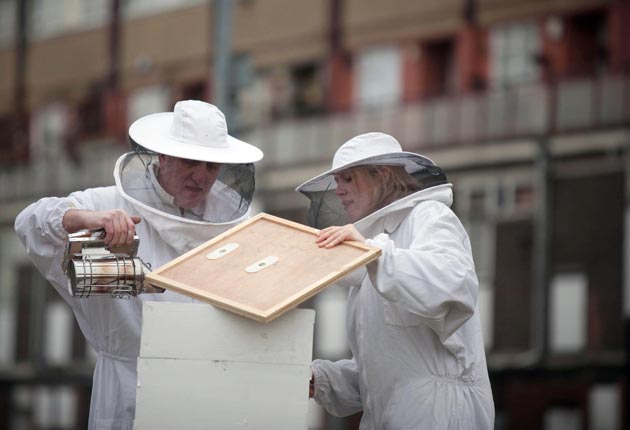Bees take flight to the city after fall in rural hive numbers
The Co-op is training an army of apiarists as bee numbers halve in 20 years

Your support helps us to tell the story
From reproductive rights to climate change to Big Tech, The Independent is on the ground when the story is developing. Whether it's investigating the financials of Elon Musk's pro-Trump PAC or producing our latest documentary, 'The A Word', which shines a light on the American women fighting for reproductive rights, we know how important it is to parse out the facts from the messaging.
At such a critical moment in US history, we need reporters on the ground. Your donation allows us to keep sending journalists to speak to both sides of the story.
The Independent is trusted by Americans across the entire political spectrum. And unlike many other quality news outlets, we choose not to lock Americans out of our reporting and analysis with paywalls. We believe quality journalism should be available to everyone, paid for by those who can afford it.
Your support makes all the difference.The buzzing of bees, part of the essence of rural life, may soon become a city sound. A new army of urban beekeepers is being recruited as part of an ambitious project to halt the worrying decline in British honeybees.
The plan is to site hives in city gardens and allotments across the UK, and even on the roofs of buildings, to help rebuild honeybee numbers, which are believed to have halved in Britain between 1985 and 2005, and more recently to have declined even more steeply in some areas.
The reasons are not clear, but it may be a combination of pesticide use, warmer winters because of climate change and infections such as that caused by the varroa mite. Honeybees in Britain produce 5,000 tonnes of honey a year and their pollination of fruit trees and other crops are estimated to be worth £165m annually.
This spring, the Co-operative Group is trying to draw 300 new people to urban beekeeping in Manchester, London and Inverness, and the great attraction for the newcomers will probably be the free training and equipment – from gloves and overalls to a hive – provided.
In the Co-op's initial trial of its urban apiary idea in Manchester last year, some 60 of the 100 people who took courses in the city's parkland went on to become beekeepers. "Most people don't realise you can readily keep bees in an urban area," said the Co-op's Environment Manager, Chris Shearlock. "They can find flowers in city parks and gardens, and they are away from some of the pesticides that are threatening them on farmland. It's a misconception to think that they won't thrive in cities and towns. I've heard of honey being sold from apiaries around King's Cross station in London."
The Co-op is offering several days of training, first in theory, on subjects such as how bees are kept, hygiene, and how hives are constructed; and then in practical work with bees. At the end of the course those who want to continue will be given their own hive and beekeeping outfit, and put in touch with a network of other beekeepers for advice. The courses will start later in the spring when bees become active.
In trying to set up environmental projects, the Co-op has found that beekeeping strikes a ready chord with people who might not otherwise want to become practically engaged.
"People are interested in bees," Chris Shearlock said. "If you talk to people about the lack of diversity in the oceans, say, they respond: 'What do you want me to do about it?' But when you talk about bees, people can do it in their own homes and their own lives."
The project is part of the Co-op's Plan Bee campaign, launched last year with the aim of raising awareness of honeybee decline, funding research and encouraging people to help bees and plant bee-friendly wild flowers.
The Plan Bee campaign has also sponsored an investigation into the population status of Britain's native version of the honeybee, the black bee, which was replaced in many hives by the Victorians with an Italian bee strain, on the grounds that the native insect was too aggressive and did not produce enough honey. But it is possible that the black bee may be able to survive conditions in the 21st century better.
Join our commenting forum
Join thought-provoking conversations, follow other Independent readers and see their replies
Comments